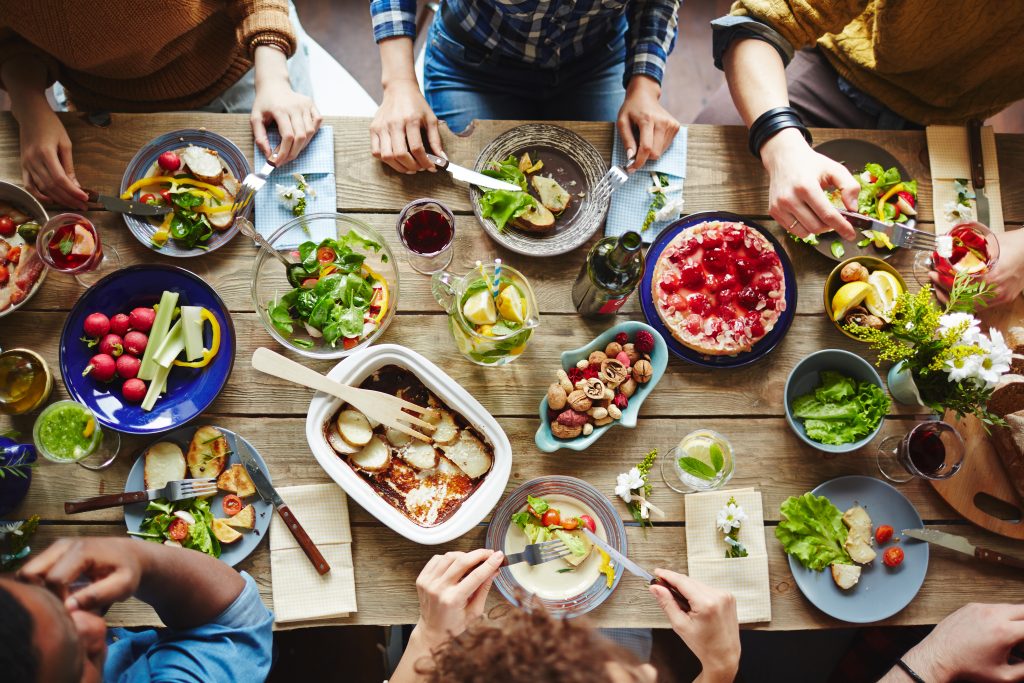Many people enjoy the holiday season with food-focused celebrations ranging from the buffet table at an office party to a feast with loved ones at home. Unfortunately, food poisoning is one of the most common problems causing people to seek medical treatment. This condition is also known as foodborne illness, and is caused by eating contaminated food with bacteria such as: Salmonella, Shigella, E.Coli, Listeria, and Clostridium botulinum. People infected with any of these bacteria can experience symptoms that range from mild intestinal discomfort, to fever, severe diarrhea, vomiting and abdominal cramps. Symptoms will usually self-resolve within 2 to 5 days. Occasionally, they may turn into a long-lasting condition causing kidney failure, brain or nerve damage, or even death.
Salmonella can be present in unpasteurized milk, undercook poultry, and eggs. It can be also passed to humans from domestic and wild animals. Salmonella could become really dangerous if it spreads to the blood because through the circular system it can reach other body organs such as the brain or kidneys.
Shigella and E.Coli are present in feces and contamination of those bacteria is associated with poor hand hygiene. E.Coli is also present on undercooked ground beef, in unpasteurized milk, and in sewage-contaminated water. E.Coli may cause a very serious condition called hemolytic uremic syndrome, which results in destruction of red blood cells and kidney failure.
Listeria is present in soil and water, causing contamination of vegetables. Apart from digestive symptoms, Listeria can cause headache, confusion, stiff neck, and loss of balance if spread to the nervous system.
Clostridium botulinum causes a very rare but extremely dangerous illness called botulism. Symptoms include: blurry vision, droopy eyes, slow speech, and muscle weakness. If not treated it may cause paralysis of arms, legs, and respiratory muscles.
If you suspect you could be infected by any of the above bacteria and you are experiencing mild symptoms, you have to make sure to drink a lot of fluids containing electrolytes to prevent dehydration. However, if your symptoms worsen, you should see your physician, and he or she will order a stool test to identify the type of bacteria. You will also be prescribed an antibiotic. You can ask your physician for an antibiotic prescription in early stages of your illness to shorten the period of your sickness and to prevent it from turning into something more complicated.
In order to prevent food poisoning you have to make sure to:
- Wash hands with soap before and after preparing meals.
- Wash hands with soap after holding animals.
- Avoid eating raw or undercooked meat and poultry products, including eggs.
- Wash fruits and vegetables before eating.
- Do not use the same utensils while preparing food to avoid cross-contamination.
- Cook your food thoroughly in high temperature to till any possible bacteria. They multiply quickest in temperature between 40˚ and 140˚ Fahrenheit.
- Make sure to properly store your food; illness-causing bacteria can grow in food within two hours unless refrigerated.
- Do not marinate meat on the kitchen counter as bacteria grow quickly in room temperature.
- If you suspect that your food could be contaminated by bacteria, based on its smell or color, throw it away.
- Wash food-contact surfaces often (cutting boards, knives, sponges, countertops).
Safe food handling rules apply not only to holidays, but they should be practiced all year long to remain free of food poisoning. Wishing you a very happy and healthy holiday season!
The information provided is for general interest only and should not be misconstrued as a diagnosis, prognosis or treatment recommendation. This information does not in any way constitute the practice of medicine, or any other health care profession. Readers are directed to consult their health care provider regarding their specific health situation. Marque Medical is not liable for any action taken by a reader based upon this information.

